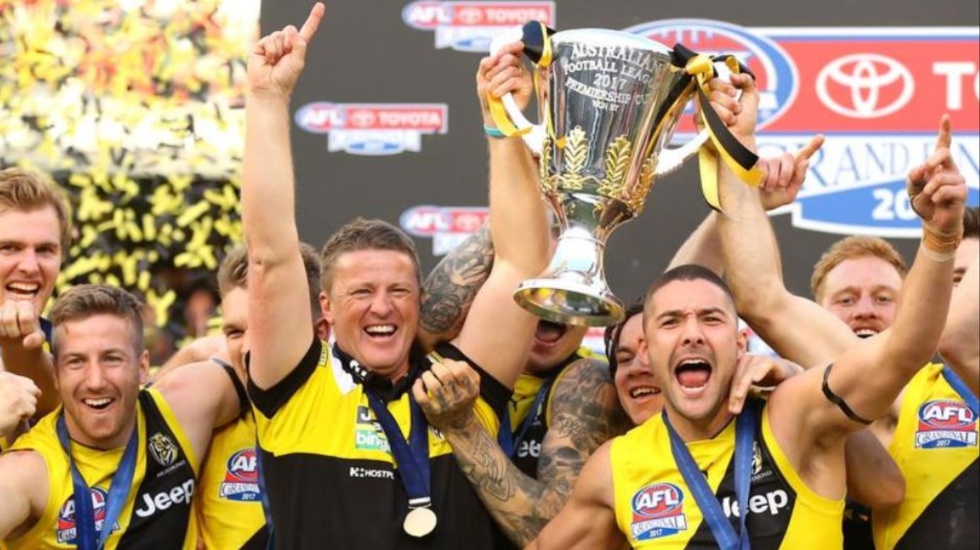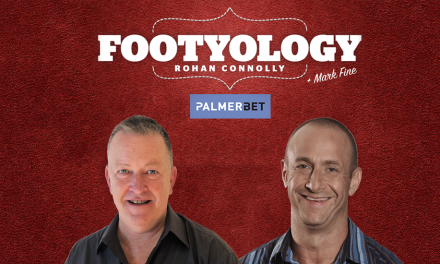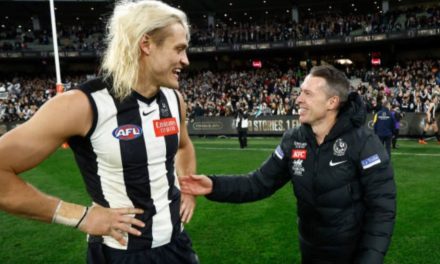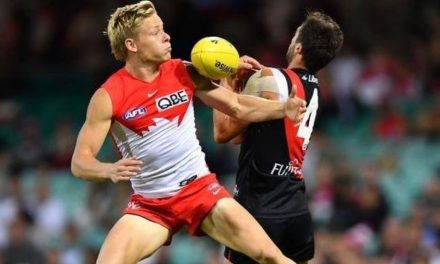Richmond coach Damien Hardwick on the premiership dais with his players after the 2017 grand final. Photo: GETTY IMAGES
Regardless of whether he coaches again or not, Damien Hardwick’s football legacy is already large. In fact, strange as it may sound, a lot larger than some still might think.
Why is that? Well, first, consider the sort of records he has already to his name. A three-time premiership coach, as many as were won by coaching legends like John Kennedy and Mick Malthouse. Only a dozen men have more flags to their name from the coaches box than does Hardwick.
There’s the fact that, along with Malthouse and none other than Ron Barassi and Leigh Matthews, he’s one of just four men to win premierships as a player or coach with three different clubs, in his case Essendon, Port Adelaide and the Tigers.
Then, of course, there’s Hardwick’s status as (by some margin) Richmond’s longest-serving coach with 307 games to his name over 14 seasons, 59 more than four-time premiership coach Tom Hafey.
Barassi, Matthews, Kennedy, Hafey, Malthouse. That’s some pretty lofty company Hardwick is keeping. Given the way the passage of time can embellish one’s status, perhaps Hardwick, too, will one day earn the sort of gravitas the mere mention of those other names inspires.
So why doesn’t it already? I think that’s also due to a personality trait which, in my view, makes Hardwick more likeable and his story even more remarkable – his humanity.
As a hard-nosed Essendon defender of the 1990s and part of that untouchable 2000 premiership team, he had a reputation as a wise-cracking, whip smart but sometimes combustible character who could occasionally “go off”.
There’s been enough times as a coach when that’s been evident also, Hardwick “cracking it” publicly, be it with someone in the media, a rival club or an administrator, over this issue or that, often the premise a fierce defence of one or more of his players.
That can be portrayed as an aggressive, alpha male edge. But in truth those tendencies are almost always a reflection of some sort of vulnerability. And far from compromising him, perhaps Hardwick’s greatest strength as a coach has ended up being his capacity not only to recognise that, but harness it as not just personally, but as a credo of sorts for an entire club.
It was there to the very last in his Richmond coaching guise, too, as Hardwick fronted the media on Tuesday alongside chief executive Brendon Gale, the man who started in his post just as Hardwick assumed his, and Tiger president John O’Rourke.
Hardwick had trouble holding his emotions in check as he thanked a lengthy roll call of people at Punt Road, but his off the cuff comments hit all the right notes, the important points for him more about the connections with people than this triumph or that.
PLEASE HELP US CONTINUE TO THRIVE BY BECOMING AN OFFICIAL FOOTYOLOGY PATRON. JUST CLICK THIS LINK.
He was chatty, reflective and funny in dealing with the inevitable barrage of questions. You could see – again – why his players delivered for him so often and for so long on the biggest stages of all.
But Hardwick himself happily admits they are heights which could never have been reached had it not been for his own personal reckoning which followed the famous internal review and his near-axing as coach after Richmond’s disastrous 2016 season.
It’s now the stuff of legend that a team finishing the 2016 season 13th on the ladder and thrashed by 113 points in the final round would win a premiership just 25 games later.
But to truly understand the depth of that change in attitude and approach at Punt Road and from its coach, you’d need to read Konrad Marshall’s remarkable insider account of Richmond’s drought-breaking 2017 premiership season “Yellow & Black: A Season with Richmond”.
Remember, too, that this cultural revolution involved a club known far more for its politics, bickering and cannibalistic tendencies for nearly 40 years than any sort of success, of which there had been precious little.
So dramatic and seemingly complete had been the freefall from VFL power which won four premierships in eight seasons under Hafey from 1967-74, to free-spending basket case stuck in the past, to a club literally on its knees come 1990 and the “Save Our Skins” fund-raising campaign, that meaningful change seemed beyond it.
The whirlpool of toxicity had eventually swallowed the likes of Danny Frawley and Terry Wallace as coaches. The importance of Gale and former president Peggy O’Neal’s resistance to the idea of also throwing Hardwick to the wolves at the end of 2016, not to mention its firm but gentle talking down of a board challenge, thus avoiding another damaging civil war, can’t be overstated.
Yet for all the clarity and changes in roles Richmond undertook in its dramatic premiership-winning metamorphosis, including the addition of a favourite son in Neil Balme as football manager, none was so crucial as the coach’s own personal epiphany.
Sure, the Tigers powered their way to three flags under Hardwick with a wildly-successful chaotic style of game based around frenetic ball movement, fierce pressure on the opposition and swarms of players around the football.
But a physical and mentally-taxing method, and the Richmond squad’s rigid adherence to it, couldn’t have achieved the buy-in it did without those players being totally sold on their coach’s honesty with them even just as people on a very fundamental level.
It’s a cultural shift which has been not only acknowledged but replicated at Richmond’s rivals throughout the AFL competition. And that in itself is a massive doffing of the cap to Hardwick.
Hafey’s name, along with the immortal Jack Dyer, are bywords for Richmond. But it won’t be long at all, just with the benefit of a little history and hindsight, before Hardwick’s, too, will be uttered in the same breath without anyone batting an eyelid.
This article first appeared at ESPN.











